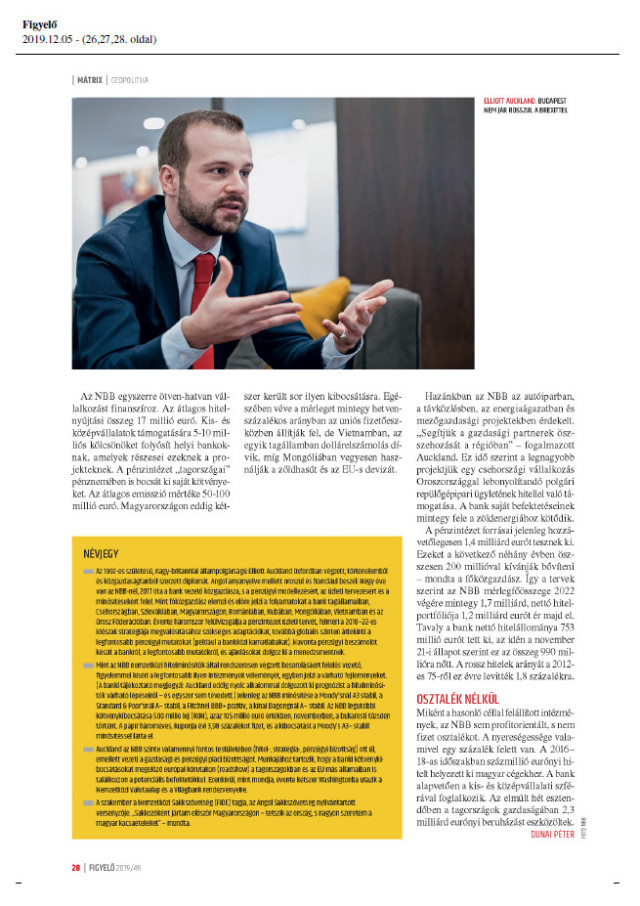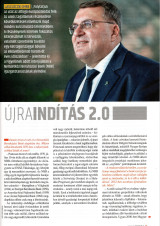IIB Chief economist spoke to the Hungarian weekly Figyelo on Brexit, the bank, the region

IIB chief economist on Brexit, the bank, the region
I am confident that Brexit will be materialized,” said chief economist of the Bank (IIB). As for all the consequences for Hungary, the United Kingdom's exit will have a very limited effect, he added. “I am not afraid of worsening British-Hungarian relations. Knowing the current prime minister's sympathy for Hungary, if Boris Johnson stays in his office, I would not be surprised if one of his first trips abroad included a visit to Budapest, " says Elliott Auckland.
We are talking primarily about our region, Central and Eastern Europe (CEE), which is also the focus of NBB's activities, as the bank's owners and founders are mostly regional. Economic recovery in the CEE region has already increased, with the Czech and Slovakian economic growth rates slowing. The Chief Economist considers Hungary's situation stable, with good macroeconomic data, but the development of the German situation will affect Budapest as well as other countries in the region. My question is whether the exodus of Britain and the possible enlargement of the Balkans (Albania and northern Macedonia) could increase the importance of the region - provided that the Balkans are also considered to be part of the Central and Eastern European region - Elliott Auckland does not give a clear answer. But he notes that one consequence of Brexit over the medium term will be increased pressure on non-Eurozone countries to adopt the Euro – Hungary included.
Turning to IIB affairs, my interviewee signalled the decisive process in the bank's life and activities, its shift towards the Central and Eastern European region. In fact, this has been going on since the relaunch of IIB in 2012 and its most important feature is the gradual decline of Russia's role. This was symbolized by the relocation of the Bank's headquarters to Budapest and the continuing decline in the number of Russians among its staff, including staff. The role of the multinational investment bank is increasingly dominating from Moscow. "We are a European bank," says the chief economist.
In support of this, he says that while in 2012, only 11 percent of the bank's loans went to Europe, in 2019 the proportion of Europe (which means the bank's EU member states) increased to 53 percent. (Russia is not Europe in this respect). This year (until November), IIB's largest borrower, with 15% of total loans, is Romania, second with Russia 14%, third with Bulgaria 13%. The structure of the share capital (EUR 340 million), according to which the three largest owners are: 1. Russia 44.2 percent, 2. Hungary 14.7 percent, 3. Bulgaria 12.3 percent. The share of Europe (the EU countries) in this respect is almost identical to the borrowing portfolio, 52.2 percent. This means that, according to bank data, Hungary has so far contributed approximately EUR 50 million to its share capital.
When referring to the bank's relationship with similar financial institutions, Elliott Auckland says without comment that a joint development bank project for a similar institution to the IIB, planned by the Visegrad Four (Hungary, Slovakia, Czech Republic and Poland), has so far been halted. Consequently, IIB is the only multilateral development bank headquartered in the region. So far, the joint Polish-Hungarian project has received support from neither Prague nor Bratislava. IIB's relationship with other banks, as detailed in November 2019 fact sheet received, is determined by regional interests, Europe.
Its business partners include the World Bank , the European Bank for Reconstruction and Development (EBRD), the European Investment Bank (EIB), and the Nordic Investment Bank (NIB). Auckland highlights its relationship with the Black Sea Trade and Development Bank (FTKFB), which is about twice the size of IIB. The BSTDB, chaired by Russian Dmitry Pankin, also has an important relationship with Moscow. IIB is headed by Nikolai Kosov. By size IIB is a small bank. Its business policy is determined by conservatism. This also manifests itself in risk taking. The bank's MPL (Maximum Possible Loss) ratio is only 1.5 percent, far below the average. It has a high capital adequacy ratio. A very conservative level of 35 percent, more than double the required rate. The bank does not accept deposits.
The bank finances 50-60 businesses at a time. The average loan amounts to EUR 17 million. To support small and medium-sized enterprises, loans of EUR 5-10 million will be made to local banks involved in these projects, the chief economist informs. IIB also issues its own bonds in the currencies of its member countries. The average size of the bond issue is EUR 50-100 million. In Hungary, such issues have been made twice so far. Taken as a whole, the balance is set at around 70 percent in euros, but in Vietnam, one of the Member States uses dollar accounting, while in Mongolia, the dollar and the euro are mixed.
As far as Hungary is concerned, IIB is interested in the automotive, telecommunications, energy and agricultural projects. "We are helping to bring economic partners together in the region," Auckland says. Their biggest project at the time is to lend to Russian company, which purchases Czech airplanes (thus support of Czech export operations). About half of the bank's treasury portfolio is tied to green instruments.
Its transactions range from a few tens of millions of euros to several hundred million euros. In downtown Budapest, which occupies one of the floors of a modern office building on Váci Road, there are dozens of people working, but according to the bank's website, they are looking for workforce. They are looking for dozens of positions, from highly qualified English-to-Hungarian, high-level finance and senior staff in building and related matters, to senior executives who deal with the bank's clients. Proficiency in English is a basic requirement, knowledge of Russian or the language of another IIB member is an advantage. All job ads apply to the Hungarian Center. The bank's current resources are approximately EUR 1.4 billion. These are set to expand by a total of € 200 million over the next few years, says the chief economist. Thus, by the end of 2022, the bank's balance sheet total is estimated to be about 1.7 billion euros and its net loan portfolio is 1.2 billion euros. Last year, the Bank's net lending stood at EUR 753 million, rising to EUR 990 million at 21 November this year. Bad loans were down from 75 percent in 2012 to 1.8 percent in 2019. Like financial institutions set up for similar purposes, IIB is not profit-oriented and does not pay dividends. Its profitability is slightly above one percent. During the period 2016-2018, the Bank lent EUR 100 million to Hungarian companies. IIB basically deals with the SME sector. Over the last seven years, EUR 2.3 billion have been invested in the economies of the Member States.
frame: Born in 1992, Elliott Auckland, a British national, graduated from Oxford with a degree in history and economics. In addition to his mother tongue, he speaks Russian and French. He has been with the Bank for four years, and since 2017 has been Chief Economist of IIB, responsible for financial modelling, business planning and ratings. As chief economist, he analyzes and forecasts developments in the Bank's member countries, Bulgaria, the Czech Republic, Slovakia, Hungary, Romania, Cuba, Mongolia, Vietnam and the Russian Federation. It reviews the Bank's business plan three times a year, assesses the adjustments needed to implement its 2018-2022 strategy, and reviews key financial indicators (such as interbank interest rates) on a global basis. Prepares monthly financial reports on the bank, key indicators (KPIs) and develops tactical recommendations for management. As the bank's chief executive responsible for the systematic rating of international credit rating agencies, he also monitors the views of key rating agencies - while also indicating the likely developments. (The bank briefing notes that there has been eight rating actions in the last three years and none of them negative). Currently IIB is rated A3 stable at Moody's, A- stable at Standard and Poor, BBB + positive at Fitch, and A- stable at Dagong China. IIB’s latest bond issue was RON 500 million, or EUR 105 million, on the Bucharest stock exchange in November this year. The bond is a three-year bond with a coupon of 3.98% pa and is rated Moody's A3 stable.
Auckland is a member of almost all important IIB bodies (credit committee, strategy committee, finance committee) and chairs the Economic and Financial Markets Committee. He also frequently participates in investor meetings during the Bank’s bond placements and represents the Bank alongside his colleagues twice a year at IMF and World Bank events.
Elliott Auckland is a member of the International Chess Association (FIDE) and is a competitor of the English Chess Association registered at 468592. "Hungary was one of the first countries I played chess in - I like the country and I really like Hungarian duck," he says.


